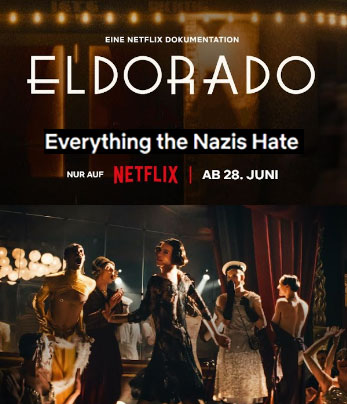(2023, 92 min)
Country: Germany
Director: Benjamin Cantu
Writer: Benjamin Cantu, Felix Kriegsheim
Studio: The Thursday Company GmbH / Netflix
Language: English
SYNOPSIS: A glittery nightclub in 1920s Berlin becomes a haven for the queer community in this documentary exploring the freedoms lost amid Hitler's rise to power.
The documentary uses stirring recreation scenes and moving archive footage to show the dazzling but brief heyday of the world's first visible queer community at the end of the 1920s in Berlin. The hub of the gay, lesbian and trans* scene at the time was the "Eldorado" in Berlin-Schöneberg. Guests from around the world could find here the spirit of sexual freedom that was typical for Berlin.
Like no other dance club the "Eldorado" thrilled most diverse guests with its program until the early 1930s. Magnus Hirschfeld frequently visited the club as did Marlene Dietrich and high-ranking National Socialists.
The documentary delves into the glorious Golden Twenties and the hopes for a more liberal future while the shadows of Nazi rule became ever more apparent.
REVIEW #1:
The “Eldorado” nightclub in late 1920s Berlin was legendary and a pillar of Berlin’s reputation as a party capital and a place of sexual diversity. Gays, lesbians and trans* people danced side by side with Marlene Dietrich and Charles Chaplin. Even a high-ranking Nazi like Ernst Röhm mingled with the guests. But the “Eldorado” became a target of the Nazi movement early on - its closure in 1932 symbolizes a totalitarian turning point. The world’s first visibly queer community was destroyed by the Nazis in just a few years. Many who had just learned about a new freedom were suddenly persecuted and murdered.
The documentary "Eldorado - Everything the Nazis Hate" is the first of its kind to sensitively trace the fates of queer people in the upheaval between the Weimar Republic and Nazi Germany. Newly discovered archival footage, interviews with last eyewitnesses and historically sensual recreations bring us closer to a queer community that was already pioneering our time, a 100 years ago.
The film was made by a predominantly queer team. In addition to director Benjamin Cantu and recreation director Matt Lambert, producer Nils Bökamp and members of the cast, such as MJ Harper, Bärbel Schwarz and Anton Rattinger (#act out) are among them.
For director and co-writer Benjamin Cantu the film is a project he has taken to his heart: "The history of the ‘Eldorado’ and especially that of queer people whose persecution did not end with 1945, was uncomfortable for the post-war public for a long time and therefore hushed up. Making this film with a great partner as Netflix is an important sign at a time when the rights of LGBTIQ* people are under pressure again in many parts of the world."
-- Notes Provided by Netflix (http://www.netflix.com)
REVIEW #2:
THE ELDORADO, THE swinging, anything-goes nightspot that gives the new Netflix documentary Eldorado its name, was an LGBTQ haven during Germany’s Weimar Republic, popular among Berlin’s trans population and anyone else who liked to let their hair down in public. It was also, as the film’s subtitle puts it, Everything the Nazis Hate. Which didn’t stop burly Hitler confidante and head of the Nazi SA paramilitary wing Ernst Röhm, a not-terribly-closeted gay man, from frequenting the establishment. As the film explains, the SA had a strong homoerotic element, a disgust with women and femininity they somehow used to justify homosexuality – for a time, anyway. At a certain point, Röhm’s friendship with Hitler could only take him so far in a Nazi regime increasingly set on eradicating homosexuality.
Röhm is but one player in this concise, deftly told doc that uses the Eldorado as a launching pad into a broader story about being gay in Nazi Germany. It’s a tale of wild nights, forbidden relationships, and, eventually, horrible consequences, a decadent scene leading to a nightmare conclusion. The film never comes out and yells it, but it is also a reminder of the Final Solution tenor that still accompanies much anti-gay and anti-trans rhetoric and, increasingly, policy.
Some of this material has been covered in the 2000 documentary Paragraph 175, named for the provision of the German Penal Code that made sexual relations between males a crime (it wasn’t repealed until 1994). And of course, there’s always Cabaret. But directors Benjamin Cantu and Matt Lambert still find plenty of ways to make Eldorado feel fresh. The reenactments are strikingly lit and acted, bringing the scene to life and enhancing the specificity of the time and place. The experts are well-chosen, the research always relevant, and the archival material of the Third Reich’s oppressions is ample. (The Nazis were nothing if not prolific self-chroniclers). But the film makes its greatest impact through the individual stories weaved throughout the bigger picture, the internal conflicts, the passions shared, the lives destroyed.
Some of the main characters are well-known. Gottfried von Cramm was the pride of German tennis — handsome, blond and blue-eyed, and the No. 1 ranked player in the world in 1937. He was also a bohemian spirit who had a passionate homosexual relationship with Manasse Herbst, a Galician Jewish actor who fled Germany in 1936. The Reich was willing to look the other way as long as Cramm played the good Aryan and kept winning. But when he lost to the American Don Budge at Wimbledon in 1937, and denounced the Nazi regime’s increasingly aggressive persecution of Jewish people, he was deemed expendable. Gottfried was arrested and imprisoned for violating Paragraph 175 and struggled to have his “crime” expunged from his record after the war.
Others here are less famous. Charlotte Charlaque and Toni Ebel were Eldorado regulars and trans pioneers, both of whom had completion surgery at Magnus Hirschfeld’s Institut für Sexualwissenschaft. Hirschfeld, a groundbreaking sexologist, both gay and Jewish and therefore a prime target of Nazi Germany, was thankfully not present when his institute was ransacked by marauding Nazi youth (here again, there are photos). An early proponent of LGBTQ rights, he was forced into exile in France, where he died in 1935, before the very worst that his country ultimately committed.
Eldorado is one of those documentaries that gives texture and context, faces and voices, to a well-chronicled period and set of circumstances. It does so with style, sensitivity, and a respect for the history it examines. Here we experience the decadence that thrived before the fall, at a hideaway for those whose differences would soon mark them for prison, exile, or, in many cases, death (it is estimated that between 5,000 and 15,000 gay people died in the concentration camps for violating Paragraph 175). We can’t change what hate looked like then. But it remains essential to take note and try to stop its encroachment now.
-- Reviewed by Chris Vognar, RollingStone (http://www.rollingstone.com)




